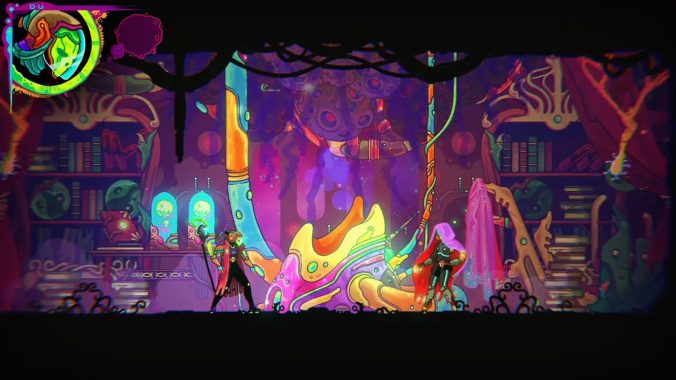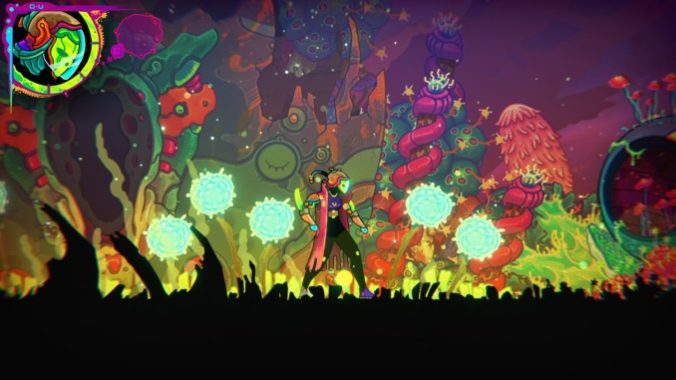Remember when games were mysterious? When all you had to go on was context, trial and error, and whatever that slim little instruction manual told you? Most games today are desperate to be understood, walking you by the hand through tutorials and training stages, teaching you exactly how to interact with it and explore it within the game itself. That’s cool, but who doesn’t like feeling confused every now and again? Piecing things together on your own time used to be a core part of playing games, and although it’s not completely a lost art today, it’s not nearly as common as it used to be. If you miss that feeling, play Ultros.
Ultros wants you to come to it. It wants you to unravel its idiosyncrasies without too much help, letting you discover its arcane rules and goals on no set schedule. Its interest in the psychedelic experience goes past the surface trappings of sight and sound, tapping into the dread, chaos, and disorientation that run parallel with the unsteady footing of an expanded consciousness. Ultros wants to bewilder and unsettle you, and what Ultros wants, Ultros gets.
It also offers hope, though. It promises an awakening, an ascension, the power and progress of reinvention at the heart of psychedelia, and although it might not offer any actual epiphanies, it does deliver that sense of accomplishment and pride in a job well done you hope to find in games.
This is a game where you constantly cycle through life and death in a boundless technicolor void known as the Sarcophagus, simultaneously adrift in space and rooted in soil. Where you encounter characters who aren’t quite sure why they’re there or what they’re doing, and who refer to off-screen lives that may or may not ever be explained within the game. Where you regularly bathe in a robotic orb filled with tie-dye amniotic fluid to save your game. Where you realize, several cycles deep, that you need to extend a chain of consciousness by hand throughout this sprawling spaceship for vague, indistinct reasons. Playing Ultros is gaming in a cloud of color and confusion, a perpetually exciting state of being that evokes the earliest days of videogames while still feeling ahead of its time.

But what do you do in Ultros, you’re probably asking. Well, you run around. You jump. Sometimes you jump a second time in mid-air. You slash through gloopy insectoid aliens in hallways that might as well be intestines while searching for pod-entombed creatures whose destruction is somehow the key to your transcendence. You try to fight them in varied, stylistically diverse ways in hopes of winding up with a well-preserved corpse, which can be devoured both to restore health and also to acquire reserves of four different resources that can be used to unlock new abilities. Sometimes you fight an evil, all-devouring stomach named Feastro the Bowel. And whenever you die, or whenever you violently liberate one of those comatose beings from their eternal sleep, you’re reborn and start the whole cycle again, building upon the progress you’ve made along the way, ideally en route to escaping the Sarcophagus—assuming that’s even possible.
You also plant seeds. It’s a whole thing. Gardening is as important as murder in the Sarcophagus.
Between your constantly shifting relationship with your surroundings, the cryptic goals and hallucinatory interactions, the structure and action of Ultros is as psychedelic as its music and art. And that’s genuinely shocking, as few games are as fiercely devoted to the psychedelic aesthetic as this one. The bright, brilliant artwork by El Huervo channels the twisty chaos of comics legend Brendan McCarthy (who might be better known today as the co-writer and designer of Mad Max: Fury Road), uniting the abstract and the visceral (literally—guts are an omnipresent symbol throughout Ultros) to create an art style unlike any other in games. Meanwhile Ratvader’s original score captures the yawning, dramatic stillness of Popol Vuh, the ambient German rock group who soundtracked several Herzog films. El Huervo’s art and Ratvader’s music are the most obvious psychedelic signifiers in Ultros, but the game itself lives up to their mind-altering ambitions.
Singular and confident, Ultros is a startling piece of work that knows exactly what it wants to be, and hones in on that goal with laser beam focus. It depends on time-tested videogame actions and concepts not just for their comfort and retro appeal, but as a familiar foundation that can be gradually fucked with as part of the game’s greater themes. And although those themes and their presentation are intentionally confusing and obtuse, Ultros never devolves into chaos for the sake of it; there’s always a clear point of view and thought process driving the game’s design. Ultros brings mystery back to gaming in brilliant fashion, delivering us the first genuinely great game of 2024.
Ultros was developed by Hadoque and published by Kepler Interactive. Our review is based on the PlayStation 5 version. It’s also available for PC and PlayStation 4.
Senior editor Garrett Martin writes about videogames, comedy, travel, theme parks, wrestling, and anything else that gets in his way. He’s on Twitter @grmartin.

